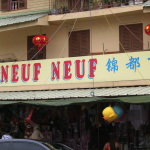
A Global History of Convicts and Penal Colonies: book launch
On July 4th 2018, the eminent scholar of empire, Professor Philippa Levine (University of Texas, Austin), launched my edited volume, A Global History of Convicts and Penal Colonies, at the annual conference of the Australian Historical Association, held at ANU, Canberra. This volume is one of the key outcomes of my ‘Carceral Archipelago’ project. […]

A Global History of Convicts and Penal Colonies
The main objective of the ‘Carceral Archipelago’ project has been to write the history of convicts and penal colonies into global history, by synthesizing existing research on some geographical contexts with new work on others. My edited volume, A Global History of Convicts and Penal Colonies, published in May 2018 , represents an important […]

Upriver to Mazaruni Prison (Guyana)
One of the wonderful things about ‘blue skies’ research is the element of surprise that it can throw up. When I began work on ‘The Carceral Archipelago’ project, I had not planned to work on the British Caribbean. I had long been aware of early-modern British and Irish convict flows to islands like Barbados, […]

Conference Report: Forced Labour, Confinement and Represssion: European, Imperial and Post-Colonial perspectives.
Two weeks ago, a joint workshop on ‘Forced labour, confinement and repression: European, Imperial and Post-Colonial Perspectives’ was hosted by The Carceral Archipelago project and The Stanley Burton Centre for Genocide and Holocaust Studies, both at the University of Leicester. Our aim was to bring into dialogue practices of coercion, confinement and forced labour […]

The “Pains of Imprisonment”: an historical sociology of penal transportation?
A few years ago, the eminent scholar of the Russian Gulag, Professor Judith Pallot, challenged me to consider the relevance of the sociology of incarceration as a means of understanding convict experiences in penal colonies. She advised me to think in particular about Gresham M. Sykes’ classic 1958 text, The Society of Captives: A […]

A Snapshot of Collaborative Work in History
During my PhD study and for the first ten years of my academic career, I researched alone. I went to the archives, I discussed and presented my work to academic audiences, and I published books and academic papers. Though like many others, I felt myself to be engaged in a larger intellectual project (subaltern studies, […]

Conceptualising Islands in History: Considering Bermuda and Gibraltar’s Prison Hulks
By Anna McKay, AHRC Collaborative Doctoral Partnership Student, National Maritime Museum & University of Leicester. As a relatively new addition to the University of Leicester’s School of History and the Carceral Archipelago project, over the last few months I feel as if I’ve undergone a thorough “academic baptism”. Since beginning my PhD studies in […]

Empire’s Exile: The Story of Lý Liễu
by Lorraine M. Paterson In 1923 in the British colony of Trinidad, a young English woman returned from visiting her family in a suburb of the capital, Port of Spain, to find that her Chinese husband of six years, Lý Liễu, had packed up his possessions and left her and their two small children. […]

Life-Writing, Prisoners of War and the Carceral Archipelago
by Grace Huxford Lecturer in Nineteenth/Twentieth Century History, University of Bristol At the Carceral Archipelago conference held in September at the University of Leicester, I delivered a paper on British prisoners of war during the Korean, on a panel regarding ‘Political Prisoners’. Chaired by Professor Mary Gibson (CUNY), with Aaron Moore (Leicester) and Natasha Pairaudeau […]

The Carceral Archipelago Conference, Leicester 13-16 September 2015
The Carceral Archipelago conference, held in Leicester from 13 to 16 September 2015, felt just like reading over thirty outstanding monographs in two-and-a-half days, getting to know their authors personally, and having the chance to reflect collectively about their mutual entanglements. It was an intense marathon through the burgeoning field of the global history of […]

Recent Comments